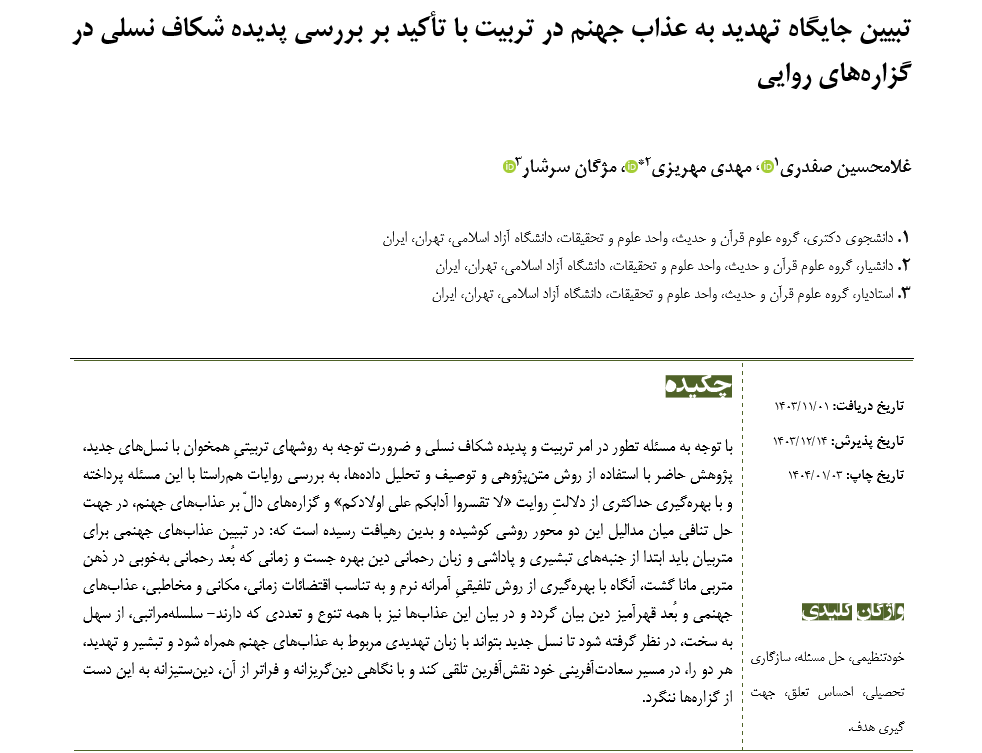تبیین جایگاه تهدید به عذاب جهنم در تربیت با تأکید بر بررسی پدیده شکاف نسلی در گزارههای روایی
کلمات کلیدی:
شکاف نسلی, تربیت, عذاب جهنم, منقوله «لا تقسروا», روایاتچکیده
با توجه به مسئله تطور در امر تربیت و پدیده شکاف نسلی و ضرورت توجه به روشهای تربیتیِ همخوان با نسلهای جدید، پژوهش حاضر با استفاده از روش متنپژوهی و توصیف و تحلیل دادهها، به بررسی روایات همراستا با این مسئله پرداخته و با بهرهگیری حداکثری از دلالتِ روایت «لا تقسروا آدابکم علی اولادکم» و گزارههای دالّ بر عذابهای جهنم، در جهت حل تنافی میان مدالیل این دو محور روشی کوشیده و بدین رهیافت رسیده است که: در تبیین عذابهای جهنمی برای متربیان باید ابتدا از جنبههای تبشیری و پاداشی و زبان رحمانی دین بهره جست و زمانی که بُعد رحمانی بهخوبی در ذهن متربی مانا گشت، آنگاه با بهرهگیری از روش تلفیقیِ آمرانه نرم و به تناسب اقتضائات زمانی، مکانی و مخاطبی، عذابهای جهنمی و بُعد قهرآمیز دین بیان گردد و در بیان این عذابها نیز با همه تنوع و تعددی که دارند- سلسلهمراتبی، از سهل به سخت، در نظر گرفته شود تا نسل جدید بتواند با زبان تهدیدی مربوط به عذابهای جهنم همراه شود و تبشیر و تهدید، هر دو را، در مسیر سعادتآفرینی خود نقشآفرین تلقی کند و با نگاهی دینگریزانه و فراتر از آن، دینستیزانه به این دست از گزارهها ننگرد.
دانلودها
مراجع
Fathi S, Motlaq M. Globalization and Generational Gap. Strategic Public Policy Studies Quarterly. 2011;5:145-77.
Shahrestani MbAK. Al-Millat wa al-Nahl. Beirut, Lebanon: Dar al-Ma'arifa.
Ibn Hamdun MH. Al-Tadhkira al-Hamdunia. Beirut: Dar Sader; 1998.
Ibn Abi al-Hadid AHB. Sharh Nahj al-Balagha. Qom: Ayatollah Marashi Najafi Library; 2005.
Sheikh Baha’i MH. Al-Kashkol. Beirut, Lebanon: Institute of Knowledge Publishing; 2004.
Shushtari NSD. Ihqaq al-Haq wa Izhaq al-Batil. Qom: Ayatollah Marashi Library; 2010.
Rashid Reza M. Literary Scientific Works. Al-Manar Magazine. 2000;111:326-36.
Al-Ghazi MH. Bayan al-Ma'ani. Damascus: Al-Tarqi Press; 2003.
Motahhari M. Islam and the Needs of the Time. Tehran: Sadr.
Baydoun L. Tasneef Nahj al-Balagha. Qom: Office of Publicity, Qom Seminary; 2018.
Jordaag J. Imam Ali: The Voice of Human Justice. Tehran: Shorouq Club; 2022.
Makarem Shirazi N. Dairat al-Ma’arif Fiqh al-Muqarn. Qom: Imam Ali ibn Abi Talib Seminary; 2006.
Nokhbeh min al-Bahthiyin QFS. Readings in the Knowledge System of Sayed Kamal al-Haidari. Kazemin: Mazamin:
Imam Javad Institute for Thought and Culture; 2019.
Noori Hamdani H. Great Scholars of Islam. Qom: Mahdi Mow’ood.
Davari Ardakani R. On Education and Upbringing in Iran. Tehran: Sokhan; 2011.
Hakimi MR. Letter. Aineh Pejohesh Journal. 1991;10:65-74.
Fazl Allah MHAA, Qazi A. Adel, Dunia al-Shabab. Beirut, Lebanon: Dar al-Malak for Printing, Publishing, and
Distribution; 2019.
Haidari SK. Ethikena. Baghdad: Imam Javad Institute for Thought and Culture; 2018.
Fathali Khan M. Basic Principles of Ethics. Qom: International Center for Translation and Publication of Al-Mustafa
(AS); 2014.
Abu Torabi A. Criteria for Healthy Behaviors from an Islamic Perspective. Ma'arifat Journal. 2004;84:16-28.
Ahmadi H. Fatimah: The Model of Life. Qom: Fatima; 2007.
Motahhari M. Introduction to Islamic Sciences. Qom: Sadr; 1996.
Motahhari M. Notes of Professor Motahhari. Tehran: Sadr; 1999.
Taherzadeh A. Imam and Imamate in Formation and Legislation. Bijar: Bina.
Ibn Babawayh MA. Al-Amali. Tehran: Ketabchi; 1997.
Ibn Babawayh MH. Ayun Akhbar al-Ridha (PBUH). Tehran: Nashr al-Jahan; 1999.
Ibn Babawayh MH. Man La Yuhadhiruhu al-Faqih. Qom: Islamic Publishing Office; 2014.
Ibn Sha’bah Harani HA. Tuhf al-Uqul ‘an Ahl al-Rasul (PBUH). Qom: Islamic Publishing Office; 2004.
Rezaei Esfahani MA. The Quran and Upbringing: An Interdisciplinary Subjective Tafsir of the Quran and Sciences.
Qom: Researches in Quranic Interpretation and Sciences; 2015.
Kolayni MbY. Al-Kafi. Tehran: Dar al-Kutub al-Islamiyyah; 2008.
Ibn Athir Jazari MM. Al-Nihaya fi Gharib al-Hadith wa al-Athar. Qom: Ismailian Publications; 1988.
Farahidi KbA. Al-Ain. Qom: Hejrat; 2010.
Askari A. Al-Furuq fi al-Lugha. Beirut: Dar al-Afaq al-Jadidah; 2001.
Thaalbi AM. Fiqh al-Lugha. Beirut: Dar al-Kutub al-Ilmiyya; 2015.
Ibn Faris A. Mu'jam Maqais al-Lugha. Qom: Maktab al-A'lam al-Islami; 2004.
Ibn Manzur MM. Lisan al-Arab. Beirut: Dar Sader; 2015.
Hosseini Zabidi MM. Taj al-Aroos min Jawahir al-Qamoos. Beirut: Dar al-Fikr; 2015.
Sajjadi SJ. Islamic Knowledge Culture. Tehran: Authors and Translators Company; 1983.
Salbia J. Philosophical Culture. Tehran: Hikmat; 2002.
Fiyumi AbM. Al-Misbah al-Muneer fi Gharib al-Sharh al-Kabeer. Qom: Dar al-Hijra; 2015.
Tarihi FDM. Majma' al-Bahrain. Tehran: Mortezavi; 1996.
Zarrinkoub AH. Literary Criticism: Exploring Principles, Methods, and Critical Issues with an Examination of the
History of Criticism and Critics. Tehran: Amir Kabir; 1994.
Azar E. The Evolution of the Word "Adab" with Emphasis on the First Three Centuries of Hijri. Journal of Persian
Language and Literature Research. 2010;18:1-19.
Hussein T. From the History of Arabic Literature. Beirut, Lebanon: Dar al-Ilm lil-Mullayin; 1991.
Sadegh al-Rafie M. History of Arabic Manners. Qom: Bina.
Mousavi Bojnordi SM. Great Islamic Encyclopedia. Qom: Center for the Great Islamic Encyclopedia; 1988.
Masbah Yazdi MT. Ethics in the Quran. Qom: Imam Khomeini Institute; 2004.
Ahmadpour. Bibliography of Islamic Ethics. Qom: Institute for Islamic Sciences and Culture; 2006.
Sayed Qutb IS. Fi Zilal al-Quran. Beirut, Cairo: Dar al-Shorouk; 1993.
Hosseini Shah HbA. Tafsir al-Eshna Ashari. Tehran: Miqat; 1984.
Sheybani MH. Kitab al-Jim. Cairo: Public Authority for the Affairs of Printing Houses; 1976.
Morovati S, Saki S. Semantics of the Word "Ethics" in the Holy Quran. Quran and Hadith Research Journal.
;8:28-58.
Hamiiri AbJ. Qurb al-Asnad. Qom: Institute of Ahl al-Bayt; 2014.
Bukhari al-Ja’fi MI. Sahih al-Bukhari. Beirut: Dar al-Fikr.
Ayazi MA. The Quran and Contemporary Culture. Rasht: Mobeen Book; 2001.
Tabatabaei HF. Majma' al-Bayan li 'Ulum al-Quran. Tehran: Nasir Khosrow; 1993.
Tabatabaei HF. Makarim al-Akhlaq. Qom: Sharif al-Ridha; 2001.
Tabatabaei HF. Al-Adab al-Diniyyah li al-Khazana al-Mu'iniyyah. Qom: Zair; 2001.

دانلود
چاپ شده
ارسال
بازنگری
پذیرش
شماره
نوع مقاله
مجوز
حق نشر 2024 نشریه پژوهش و نوآوری در تربیت و توسعه

این پروژه تحت مجوز بین المللی Creative Commons Attribution-NonCommercial 4.0 می باشد.










